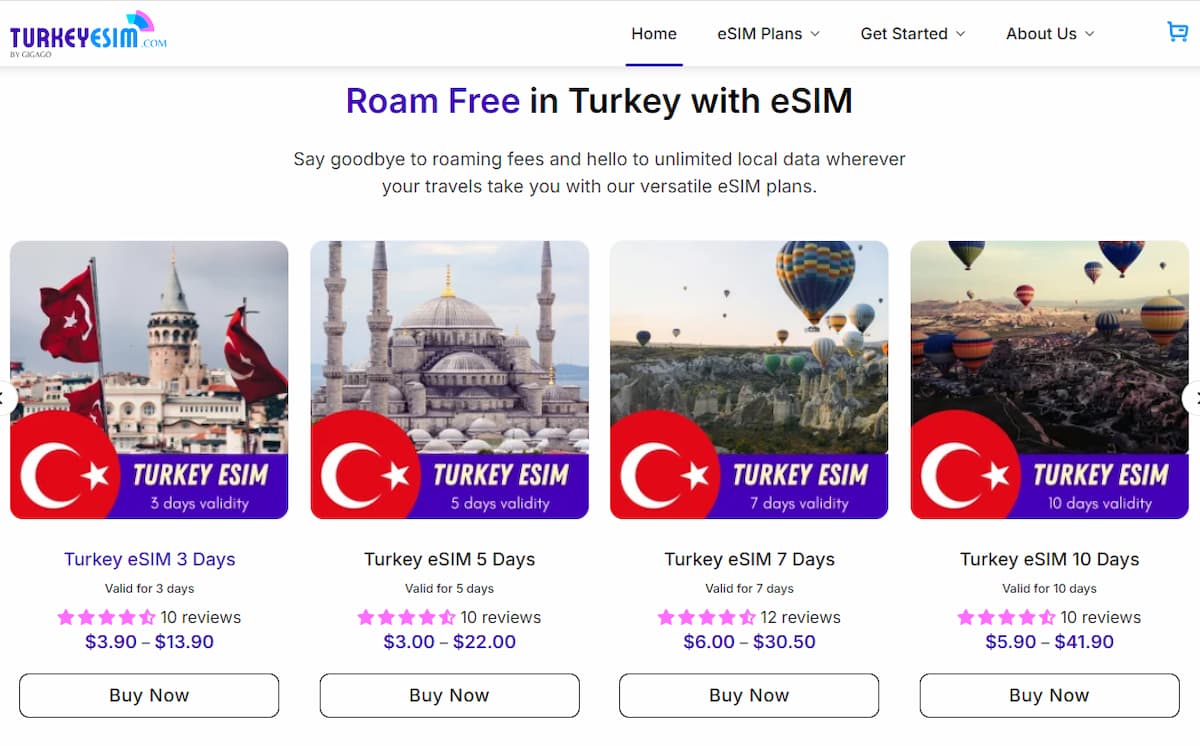The Ultimate Turkey Travel Packing List: Must-Haves to Pack
Turkey is an incredible destination for backpackers, blending rich history, diverse landscapes, and vibrant culture. So, what makes backpacking in Turkey so special is its affordability, and well-developed infrastructure.
In this guide, we’ll equip you with a comprehensive guide to Turkey Travel Packing List which help you have a smooth and enjoyable trip in Turkey.

Table of Contents
Best Time to Visit Turkey
The best time to visit Turkey largely depends on your travel preferences, but spring (April to June) and autumn (September to November) are ideal for most backpackers.
- Spring (April – June): The weather is mild and pleasant, making it great for exploring cities and hiking. The countryside is lush and blooming, perfect for outdoor adventures.
- Autumn (September – November): Temperatures are cooler, and there are fewer tourists. The Mediterranean coast is still warm, making it a fantastic time for beach lovers.
- Summer (July – August): Although summer is hot, it’s still a popular time for those heading to the beaches along the Aegean and Mediterranean coasts.
- Winter (December – March): Winter is ideal for visiting the less crowded cities and skiing in the mountains, though parts of the country, especially the interior, can get cold.
Best Places to Visit in Turkey
Turkey is a large and diverse country with several must-visit locations for backpackers. Here are some of the best places to visit in Turkey:
- Istanbul: The cultural and historical heart of Turkey, Istanbul is famous for its magnificent architecture, vibrant bazaars, and rich history. Highlights include the Hagia Sophia, Blue Mosque, and bustling Grand Bazaar.
- Cappadocia: Known for its fairy-tale-like landscapes, Cappadocia is famous for hot air balloon rides over surreal rock formations, ancient cave dwellings, and underground cities.
- Pamukkale: Often referred to as the “Cotton Castle,” Pamukkale is known for its white travertine terraces and thermal springs. Nearby is the ancient city of Hierapolis.
- Ephesus: One of the most well-preserved ancient cities in the world, Ephesus is home to the Temple of Artemis, the Library of Celsus, and the Great Theatre.
- Antalya: A gateway to Turkey’s Mediterranean coast, Antalya offers beautiful beaches, ancient ruins, and a charming old town.
- Mount Nemrut: Famous for its giant statues and impressive mountain views, Mount Nemrut is a UNESCO World Heritage Site and an incredible spot for hiking.

Turkey Travel Packing List: Things to Do in Turkey
- Take a Hot Air Balloon Ride in Cappadocia: This is a once-in-a-lifetime experience where you can float over the fairy chimneys and enjoy stunning sunrise views.
- Explore Istanbul’s Historic Sites: Visit the Hagia Sophia, Topkapi Palace, and the Blue Mosque, and immerse yourself in the fascinating history of Istanbul.
- Relax in a Turkish Bath (Hammam): Experience a traditional Turkish bath, a cultural ritual that will leave you feeling refreshed and rejuvenated.
- Walk Along the Lycian Way: This scenic long-distance hike along the Mediterranean coast offers incredible views, ancient ruins, and charming villages.
- Visit Pamukkale’s Thermal Pools: Soak in the natural thermal pools while taking in the stunning white terraces.
- Explore Ancient Ruins in Ephesus: Wander through the ancient city of Ephesus and marvel at its grandeur.
- Cruise the Turquoise Coast: Take a boat trip along the stunning Mediterranean coastline and enjoy beautiful beaches, clear waters, and coastal towns.
Best Accommodations for Backpackers in Turkey
Turkey offers a wide range of budget-friendly accommodations for backpackers, including hostels, guesthouses, and budget hotels.
- Hostels in Istanbul: There are plenty of affordable hostels in Istanbul, with some located near the major attractions in Sultanahmet and Beyoglu. Cheers Hostel and Bahaus Hostel are popular choices.
- Guesthouses in Cappadocia: In Cappadocia, many backpackers opt for guesthouses or cave hotels. Sultan Cave Suites and Göreme House offer a unique experience while remaining budget-friendly.
- Beachfront Hostels in Antalya: Antalya offers beachfront hostels like Role Street Hostel, which provide a perfect mix of sun, sea, and city exploration.
- Budget Hotels in Pamukkale: Pamukkale has several budget accommodations, like Melrose House Hotel, offering easy access to the hot springs and ancient ruins.
Turkey Backpacking Costs
Turkey is an affordable destination for backpackers. Here’s an estimate of daily costs:
- Accommodation: $10-$20 per night for a hostel or budget guesthouse.
- Food: $5-$15 per day. Street food like kebabs, simit (Turkish bread), and gözleme (stuffed flatbread) are cheap and delicious. A sit-down meal costs about $5-$10.
- Transport: Intercity buses are the most common way to travel between cities, costing $10-$30 depending on the distance. Public transport within cities is cheap, with metro and bus rides typically costing less than $1.
- Activities: Entrance fees to major attractions range from $5-$15. Hot air balloon rides in Cappadocia are pricier, averaging $100-$200.
A daily budget of around $30-$50 is reasonable for most backpackers in Turkey.
How to Stay Connected in Turkey
Staying connected while backpacking in Turkey is easy. You can either buy a local SIM card or use an eSIM if your phone supports it.
- SIM Cards: Turkcell, Vodafone, and Türk Telekom are the major providers. You can purchase a SIM card with data packages at the airport or local shops.
- Wi-Fi: Free Wi-Fi is common in cafes, hostels, and restaurants, especially in larger cities and tourist areas.
- Turkey eSIM: If your phone supports eSIM technology, consider getting an eSIM plan to save time and inconvenience.
Consider using an eSIM from turkeyesim.com as the #1eSIM provider in Turkey, which offers diverse plans for any traveling goals.
Find the best Turkey eSIM plan below:

FAQs About Backpacking in Turkey
1. Is Turkey safe for backpackers? Yes, Turkey is generally safe for travelers. Stick to popular tourist routes and exercise normal safety precautions, especially in busy areas.
2. Do I need a visa for Turkey? Most nationalities need a visa to enter Turkey, but it can be obtained easily online through the e-visa system.
3. What should I pack for a backpacking trip in Turkey? Pack light, comfortable clothing, good walking shoes, and appropriate attire for visiting mosques (covering shoulders and knees). If visiting in winter, bring warm clothes for colder regions.
4. Is English widely spoken? English is commonly spoken in tourist areas, but it’s helpful to learn a few Turkish phrases for convenience.
Backpacking in Turkey is a rewarding and budget-friendly experience. With stunning landscapes, historical wonders, delicious food, and welcoming locals, it’s no wonder this destination continues to attract adventurous travelers.



